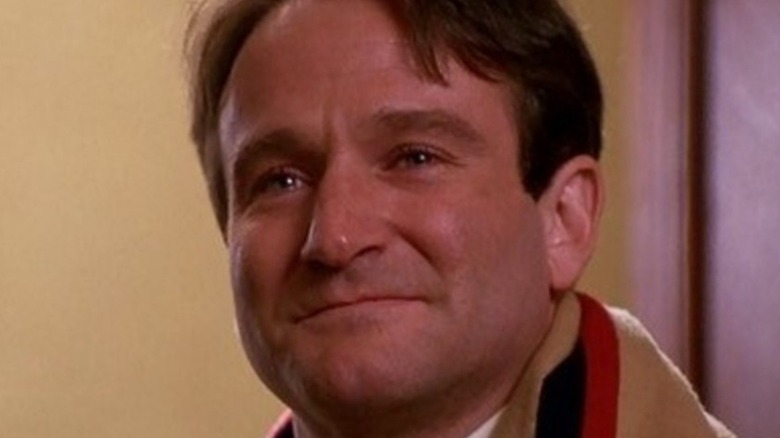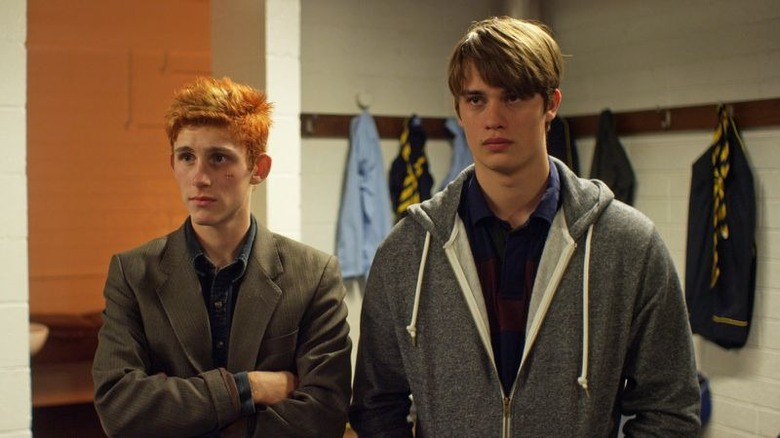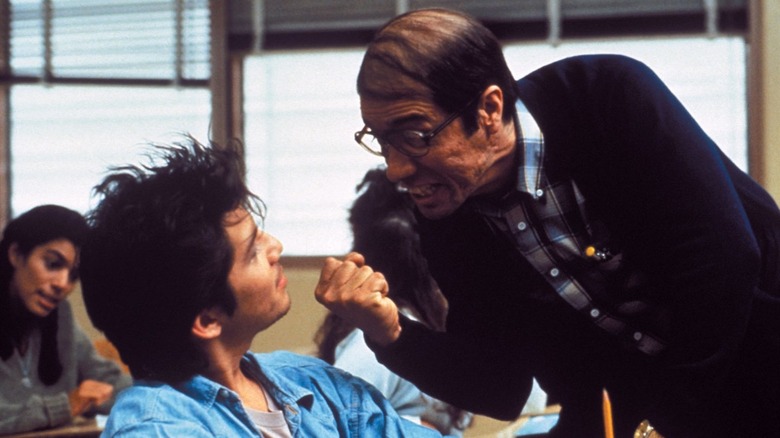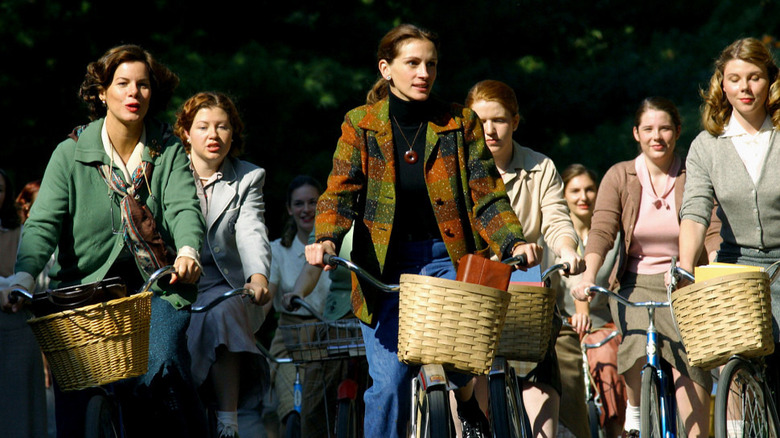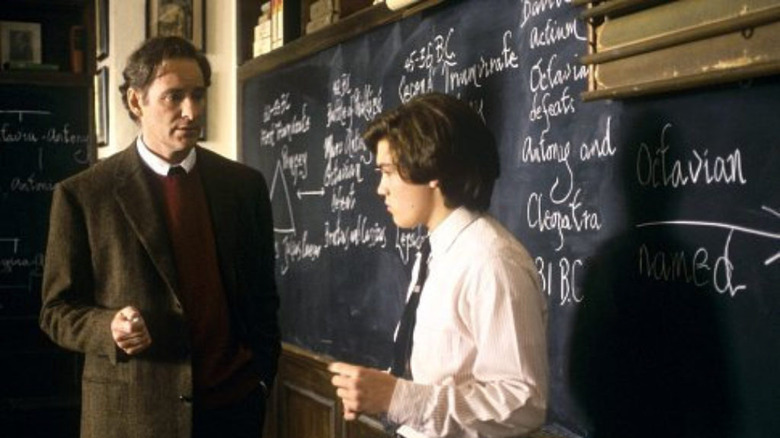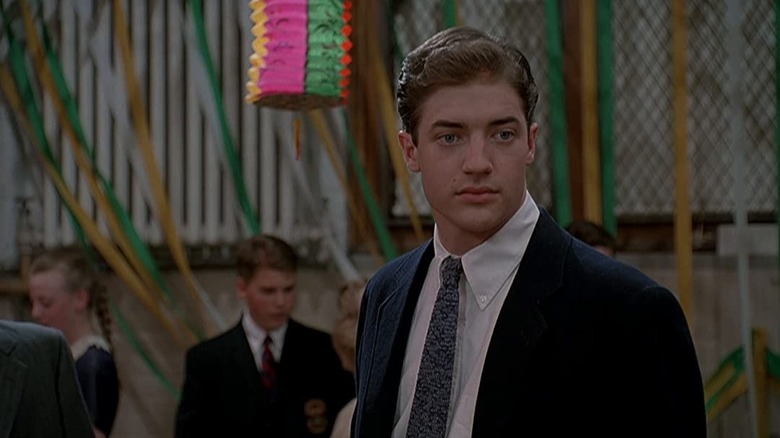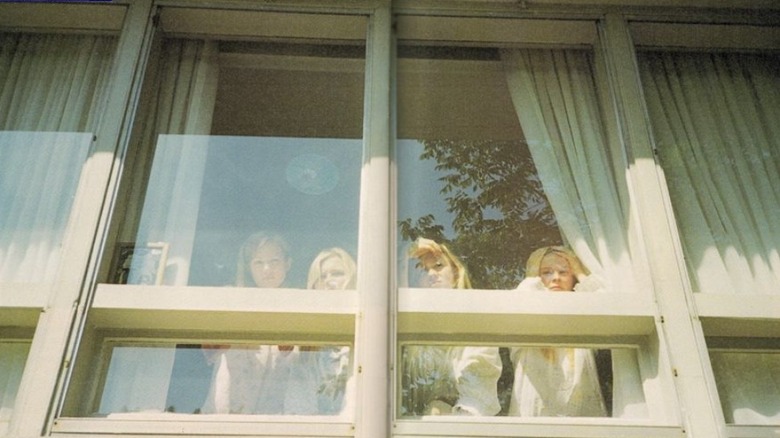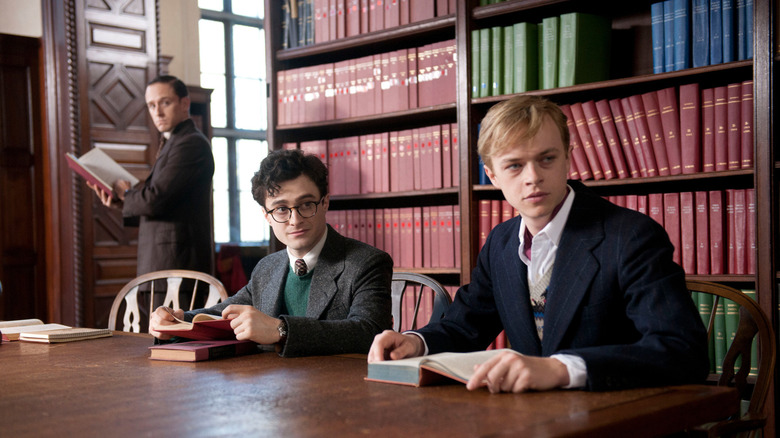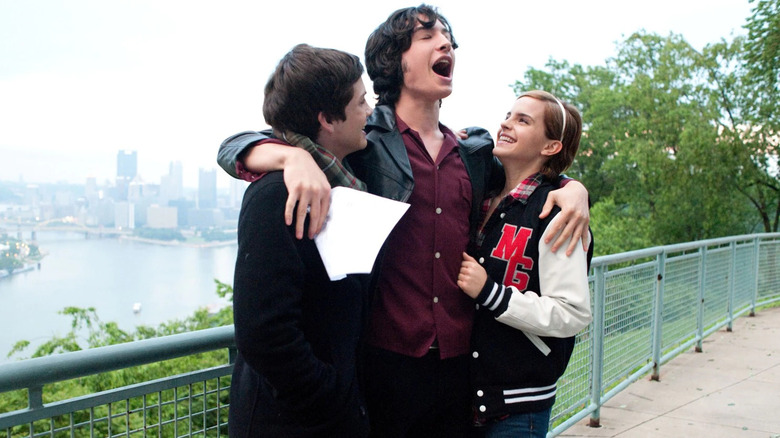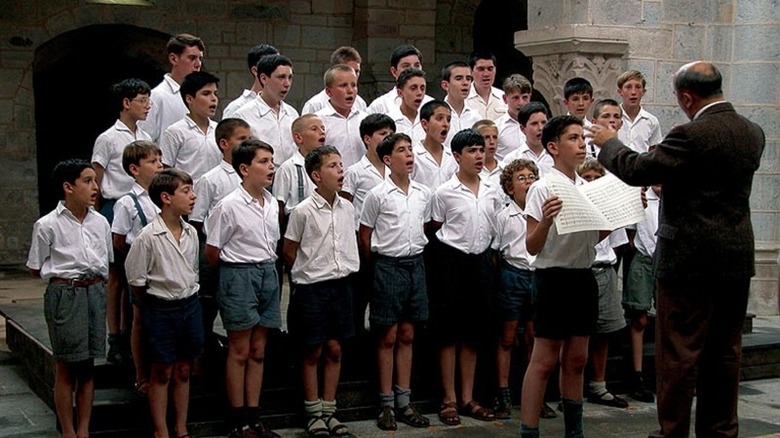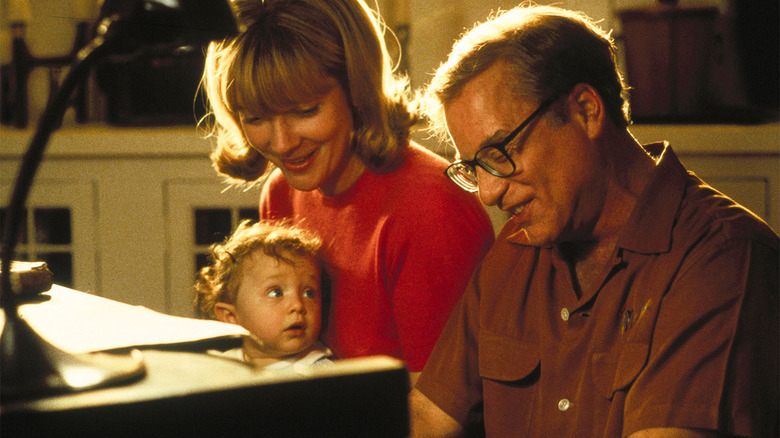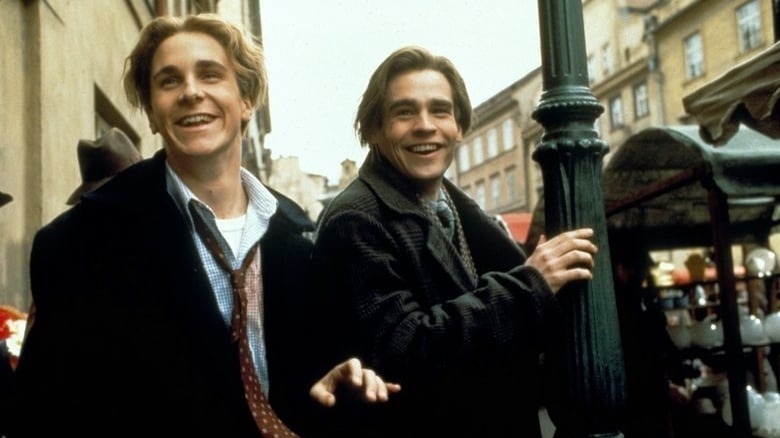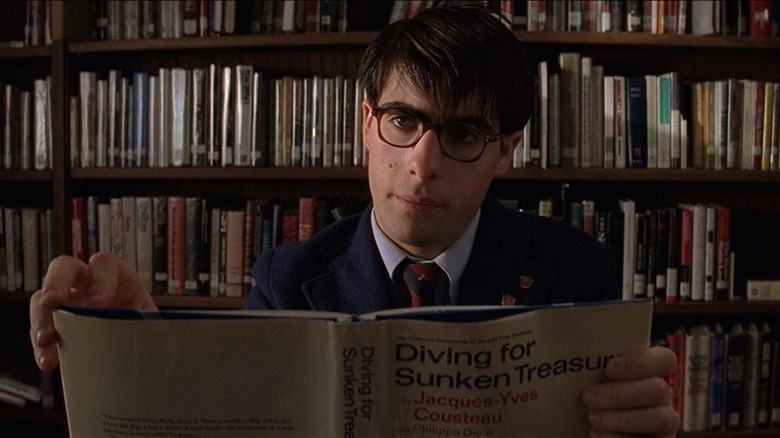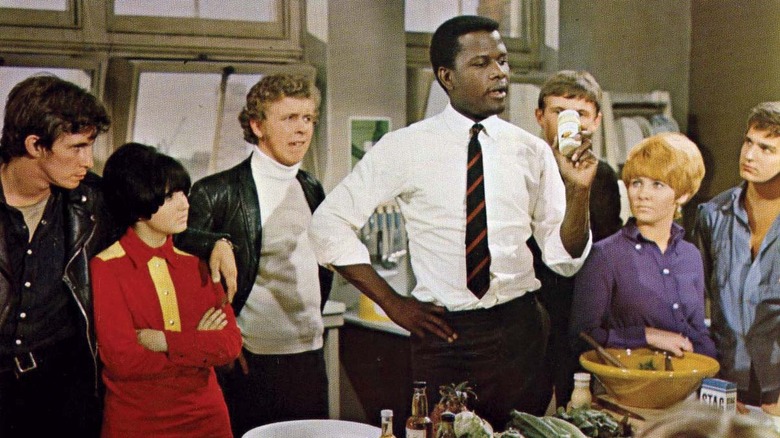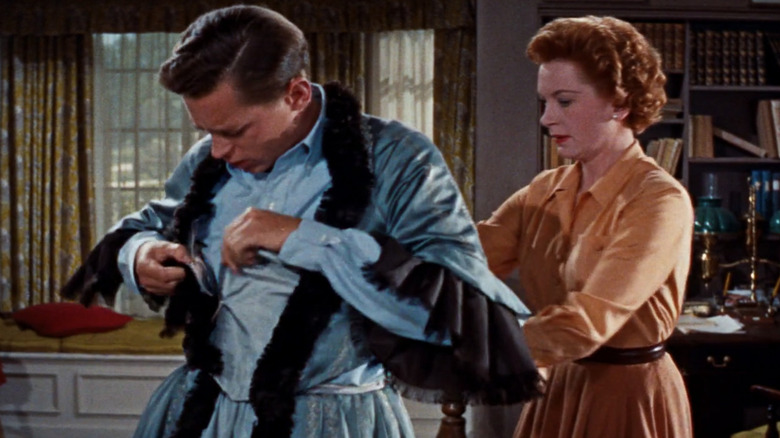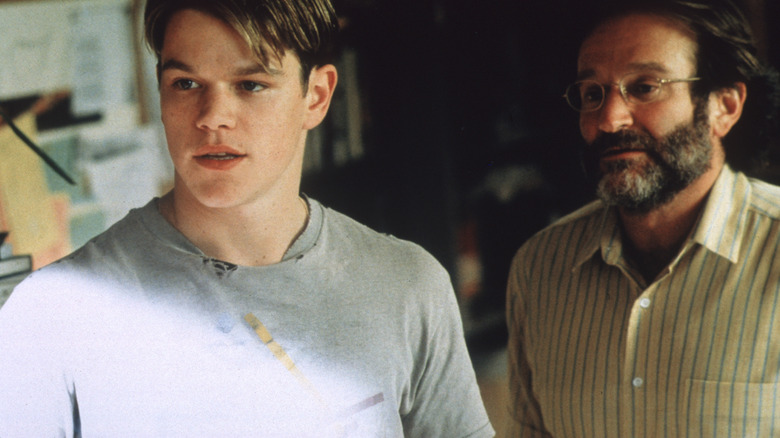15 Movies Like Dead Poets Society You Definitely Need To See
"Carpe diem," Robin Williams whispers as the kindly English professor John Keating, giving voice to the generations of men who came before his students. "Seize the day. Make your lives extraordinary."
It is this sense of inspiration that defines "Dead Poets Society." In it, Williams plays an unconventional teacher who attempts to break his well-heeled prep school students out of their slavish devotion to the prosaic, utterly unremarkable lives that otherwise await them. In response, a group of boys form the Dead Poets Society, a space where they can engage their creativity at a school that demands conformity.
"Dead Poets Society" was a massive critical and commercial success. It earned $239 million on a $16.4 million budget, and was nominated for four Academy Awards (best picture, best director, best actor, and best original screenplay, the last of which it won). But it's far from the only coming-of-age drama that deals with similar themes. So, if you're a "Dead Poets Society" fan, hop up on a desk and check out some other films that you'll probably like just as much.
Handsome Devil
For "Handsome Devil," we travel across the Atlantic to an Irish boarding school, where a pair of unlikely roommates attempt to survive the academic year. Ned (Fionn O'Shea) is an outsider at his rugby-obsessed school, a sensitive writer trapped in a hypermasculine hellscape that he can't seem to break free from. When he gets a new roommate, Conor (Nicholas Galitzine), his problems only get worse.
Rather than a kindred spirit, Conor is a star rugby player who immediately fits into the community in ways that Ned has never been able to. But he also has a secret, one that threatens to risk his social standing if it gets out. "Handsome Devil" grapples with the culture of conformity that dominates many boarding schools, but the dynamic between Conor and Ned is the most compelling aspect of the film. O'Shea and Galitzine have great chemistry together, and watching their friendship develop in spite of the social expectations both of them faceis a delight.
Stand and Deliver
The classroom in "Stand and Deliver" couldn't be further from that of "Dead Poets Society," but both films feature a teacher who's trying to help their students blossom in a way that will help them navigate the world after they leave school. Edward James Olmos stars in "Stand and Deliver" as Jaime Escalante, a math teacher who transfers to a poor high school in East Los Angeles. It's rare that his predominantly Latino students have teachers who believe in them, let alone set high expectations for their academic behavior. But Escalante sees their potential, and does his best to make sure they pass the AP Calculus exam during their senior year
Based on a true story, "Stand and Deliver" was tremendously popular with both audiences and critics alike, earning a best actor Oscar nomination for Edward James Olmos. It would ultimately garner a spot on the American Film Institute's 100 Years ... 100 Cheers: America's Most Inspiring Movies list.
Mona Lisa Smile
Released about 15 years after "Dead Poets Society," "Mona Lisa Smile" hits a lot of the same beats, but with a cast comprised mostly of women. Julia Roberts stars as Katherine Anne Watson, an art history professor who joins the faculty of Wellesley College in 1953. At the time, many of her well-bred students were expected to attend college largely as a way to meet promising young men and get engaged, after which they could leave school having obtained their MRS degree.
Through Katherine's mentorship, her students slowly begin to reevaluate their plans for the future in relation to traditional gender norms. "Mona Lisa Smile" makes it clear that there is more than one path for a woman to choose, and that she can become a homemaker and mother if she wants, but that there are other options. For that reason, "Mona Lisa Smile" stands out as a quaint testament to female agency. It's not particularly fiery, but it is impactful nonetheless.
The Emperor's Club
Like John Keating in "Dead Poets Society," William Hundert (Kevin Kline) in "The Emperor's Club" seems to relish his professorship at a private boarding school for boys not just because he gets to teach his chosen subject, but also because he can serve as a compass to guide his students on their journey to becoming civilized members of society. Hundert teaches history and presides over the annual "Mr. Julius Caesar" trivia competition, which is an honor to compete in for all of his students.
All of his students except one, that is. Sedgewick Bell (Emile Hirsch) is gregarious but lazy, unwilling to put in hard work when he can simply rely on his wealth and privilege. "The Emperor's Club" subverts the trope of the inspirational teacher who helps his students meet their potential: Try as Hundert might to make Sedgewick into a man of honor, he is unable to break through a lifetime of entitlement. In fact, Hundert is so focused on rehabilitating this one particular boy that he fails to notice the positive impact he's had on the other students in his class, a reminder that it isn't enough to want someone to improve their character — they have to want to change, too.
School Ties
Traditional American boarding schools are pretty much what we see in "Dead Poets Society." They're not particularly diverse, especially in the 1950s. "School Ties" tackles the subject of prejudice and discrimination in this setting, with Brendan Fraser playing David Greene, a Jewish football player who receives a scholarship to an elite private school. There aren't a lot of Jewish kids at his new school — in fact, there aren't any. So, Greene finds himself hiding his religion until a classmate discovers the truth, exposing him to ridicule and harassment.
"School Ties," released just a few short years after "Dead Poets Society," may feel like little more than an effort to capitalize on a more successful film. But although the narrative itself is fairly rote and predictable, it features strong performances from its young cast: not just Brendan Fraser in the lead role, but his co-stars Matt Damon, Ben Affleck, Anthony Rapp, Cole Hauser, and Chris O'Donnell.
The Virgin Suicides
Less about school and more about the fragility of adolescence, "The Virgin Suicides" is a sensitive, poignant coming-of-age story. Directed by Sofia Coppola, it revolves around a group of teenage sisters who have been heavily sheltered by their strict, religious parents, and who kill themselves, one after the other. They are ethereal and otherworldly, and we are kept at arm's length from them as we see them through the eyes of the boys who are fascinated by them. All girls are a mystery to 15-year-old boys, but these girls are especially so.
"The Virgin Suicides" would serve as a launching pad for several talented young actors, including Kirsten Dunst, Josh Hartnett, and Hayden Christensen. It empathetically brings to life the pain of adolescence and of feeling almost physically stifled by parents who don't understand you that we see with equally tragic consequences in "Dead Poets Society."
Kill Your Darlings
"I saw the best minds of my generation destroyed by madness," Allen Ginsberg would write in his famous poem, "Howl," which is now regarded as one of the finest pieces of modern American literature. But before he was Allen Ginsberg, beat poet, he was just another anti-establishment undergraduate at Columbia University. Starring Daniel Radcliffe as Ginsberg, "Kill Your Darlings" explores the developing friendship between him and Lucien Carr, another key figure in the Beat Generation, played by Dane DeHaan.
Also featuring Ben Foster as William S. Burroughs (who would later become famous for accidentally killing his wife, fellow poet Joan Vollmer, in a William Tell-inspired effort to shoot an apple off her head) and Jack Huston as Jack Kerouac, "Kill Your Darlings" is a great watch for audiences interested in mid-20th century American literature. But really, it's the tremendous chemistry between the two main leads that keeps the production afloat.
The Perks of Being a Wallflower
Based on a novel by Stephen Chbosky, "The Perks of Being a Wallflower" is the story of a withdrawn teenager who, not unlike Ethan Hawke's painfully shy character in "Dead Poets Society," finds a sense of belonging in a group of extroverted friends. Logan Lerman plays Charlie, a boy who begins his freshman year of high school under the shadow of clinical depression and a recent stay at a psychiatric institution. But despite being ready to go through the year lonely and miserable, two upperclassmen take him under their wing, and he begins to open up again.
Lerman proves once again to be one of the most underrated child-turned-adult stars of his generation as Charlie, and his co-stars are just as good: Ezra Miller shines as the gregarious Patrick, and Emma Watson of "Harry Potter" fame has never been better than she is here.
The Chorus
Another in the crowded inspirational teacher genre, "The Chorus" has a decidedly continental flavor. Set in post-World War II France, "The Chorus" follows Clement Mathieu, a struggling composer who accepts a job as a teacher at a boarding school for troubled boys. He is initially overwhelmed by the unruly students and depressed by the constant reminder that his teaching gig means that he's given up on his dreams.
But before long, Mathieu finds himself inspired by the boys, especially one particularly talented student, and pours all of his creativity into writing music for the new boys' choir. It's a charming story, but what helps it rise above other similar films (indeed, "The Chorus" would be nominated for best foreign language film and best original song at the Academy Awards) is the beauty of its score and the raw talent of the young vocalists.
Mr. Holland's Opus
Like many of the inspirational teachers who seem to find their way into films, Mr. Holland (Richard Dreyfuss) of "Mr. Holland's Opus" initially had different aspirations. He dreams of becoming a famous composer, but in order to provide for his family, takes a job at a local high school in 1964, assuming that he'll work there for a few years while composing his symphony at nights and on weekends. But it doesn't take long before he realizes how unrealistic his plan is and, almost without realizing it, he becomes increasingly invested in the lives of his students. The more he pours into the job, the greater the reward at the end of each year, when he sees a new class of students achieve their goals.
Like Keating in "Dead Poets Society," Holland is not under any illusion that the art he teaches his students will end up being anything more than a hobby. But he's equally confident that art, music, poetry, and theater all wiggle their way into the hearts and minds of children, influencing the type of person they will grow up to be. In this way, his students are his opus, a reflection of a lifetime's work made into something beautiful.
Swing Kids
In "Dead Poets Society" in 1989 and "Swing Kids" in 1993, Robert Sean Leonard plays two similarly sensitive characters: They're both part of informal groups of teen boys who just want to be left alone with their art, but find their ambitions crushed by their overbearing, unyielding elders. One attends a traditional boarding school, and one is in the midst of Nazi Germany.
The swing kids that we see in the latter film are obsessed with music, dancing, American slang, and anything that flies in the face of the oppressive regime that has taken over their lives. Leonard's Peter, alongside Christian Bale as his best friend Thomas, attempt to play both sides: They're part of the Hitler Youth by day, and dance at forbidden swing clubs by night. But leading a double life isn't easy, and the distinctions between the two halves of their identities become blurred. There are parts of "Swing Kids" that have more than their fair share of corny antics, but on the whole, it's a poignant film about the youth resistance movement in Nazi Germany that is frequently overlooked.
Rushmore
Max Fischer, the protagonist of "Rushmore," doesn't exactly fit in at his elite private school. For one thing, he's a scholarship student, and overcompensates by making himself hyper-visible as a founder of dozens of extracurricular organizations, often at the expense of his own grades. In addition, his best friend is a rich industrialist (Bill Murray), who is the father of two of his classmates and an unwitting rival for the affections of elementary school teacher Rosemary Cross (Olivia Williams.)
A lot of films about boarding schools are stoic and self-serious, which Max Fischer's deadpan demeanor cheekily reflects. The entire film exists in a sort of heightened reality, almost as though we're watching one of Max's plays about his own school experiences. Its oddball sense of humor and strange relationship dynamics are quintessential Wes Anderson, and they create a charm that makes "Rushmore" one of his most endearing films.
To Sir, with Love
In "Dead Poets Society," the students have the weight of the world on their shoulders. Everyone expects great things from them. The opposite is true of the students in "To Sir, with Love," who live in poor neighborhoods on the East End of London where no one expects them to make anything of themselves. Both films are linked, however, by the presence of a great teacher.
Sidney Poitier stars in "To Sir, with Love" as an engineer who takes a position at a rough inner-city school while waiting to hear back about a job. He is initially repelled by his students, who are loud, belligerent, and make no effort to hide their lack of respect for authority. The students and teacher regard one another with contempt that borders on outright hostility. But the more time he spends with them, the more the teacher begins to foster a connection with his pupils, giving them a roadmap for how to enter the world as responsible adults. Poitier is dignified and charming, of course, and he's joined by several talented young performers, including popular singer Lulu, whose recording of the title track "To Sir, with Love" would become a hit.
Tea and Sympathy
When you're at an all-boys school, there's an overwhelming pressure to live up to certain standards of masculinity — it would be hard to avoid it, with all the testosterone in the air. But Tom Robinson Lee (John Kerr) in "Tea and Sympathy" is just ... different. He's not interested in sports, instead preferring to play music while sitting on his dorm room's windowsill. The only real connection he's managed to make is with the kindly wife of his school's coach, Laura Reynolds (Deborah Kerr), who offers a warm respite when the mockery of his classmates and his father become too much to bear.
"Tea and Sympathy" is based on a play of the same name by Robert Anderson, an unmistakably queer text that is considerably more overt about Tom's sexuality and the prejudice he faces as a result. The film has its impact somewhat blunted by a tacked-on scene at the end in which a grown up Tom Lee visits the school with his wife, production codes seemingly shutting the door on any overt interpretation of Tom as gay. This ending was criticized even at the time, with critic Bosley Crowther of the New York Times recommending that the audience simply leave after Laura Reynolds' most famous line: "Years from now, when you talk about this — and you will — be kind."
Good Will Hunting
A lowly janitor stares at a math equation on a Harvard College blackboard, deep in thought. Before long, he solves it, a working-class stiff doing what a classroom full of privileged Ivy League students could not. That's the story at the heart of "Good Will Hunting," the film that put Matt Damon and Ben Affleck on the map.
Damon stars as Will Hunting, a math prodigy from the rough part of Boston who avoids jail time for his part in a brawl on two conditions: First, that he studies mathematics under the tutelage of a Harvard professor who is amazed at his natural gifts, and second, that he attends therapy sessions. Williams plays his therapist, whose warm and unpretentious conversation eventually allows Will to open up to him and heal from childhood traumas.
"Good Will Hunting" was a massive success, receiving overwhelmingly positive reviews and earning two Academy Awards: one for Williams as best supporting actor, and one for Matt Damon and Ben Affleck for best original screenplay.
